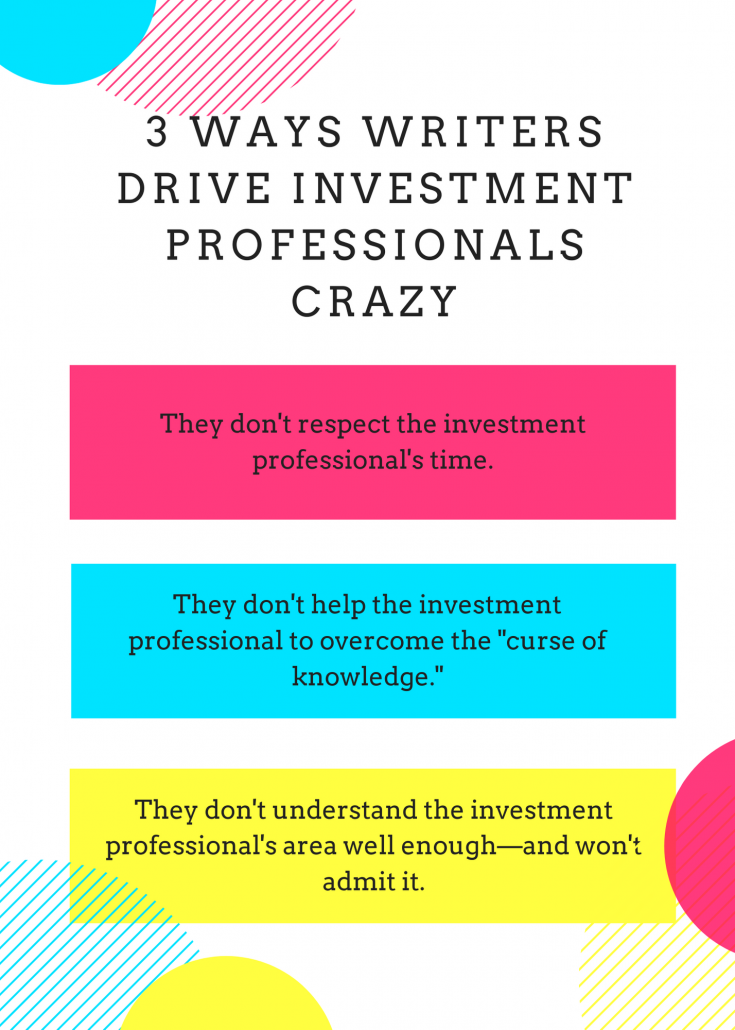3 ways writers drive investment professionals crazy
Investment professionals play an essential role as subject-matter experts. As writers, we help them to share their expertise. But sometimes we get on their nerves and waste their time. If you’re a writer, please try to avoid these three ways writers drive investment professionals crazy.

1. Don’t respect the investment professional’s time
Investment professionals are busy trying to help clients make money and achieve their goals. That’s a full-time job. When many of them were hired, no one told them they’d need to become sources for marketing communications. It’s not surprising that they feel annoyed when writers pester them for interviews, reviews of written materials, and answers to questions.
Investment writer tips: Tell the subject-matter expert how your request will help the firm serve its clients and prospects. Manage the expert’s expectations for deadlines. Don’t wait until the last minute to make requests. Make it easy for the expert to schedule any appointment you request by suggesting multiple time slots instead of saying “When can you meet?” Show up on time—or slightly early—for appointments.
2. Don’t help the investment professional to overcome the “curse of knowledge”
Investment professionals are enthusiastic about their fields, right down to the nitty-gritty details, and their speech may favor technical vocabulary. However, if you’re a writer for a non-technical audience, it’s your responsibility to simplify and explain the expert’s technical pronouncements. You need to help them overcome the “curse of knowledge,” as explained by Chip and Dan Heath.
Investment writer tips: Remember that you’re not a transcriptionist, you’re an interpreter. Press your interviewee when you don’t understand. Write for your audience’s level of knowledge. Check out “Resources to help you cut through investment jargon.” Don’t be one of those “Financial white paper writers who say ‘yes’ ” when they shouldn’t.
3. Don’t understand the investment professional’s area well enough—and won’t admit it
Writers who work with investment professionals rarely know their assigned topics as well as the subject-matter expert whom they’re interviewing or editing. That’s okay because we bring different skills. However, a mismatch between the investment professional’s expectations and the writer’s expertise can frustrate investment professionals. This problem is especially bad when the writer is a financial newbie who says “uh huh” to the interviewee, then mangles the information in their write-up. That will drive investment professionals crazy.
Investment writer tips: Don’t be afraid to admit your lack of knowledge, but do some research so you’re not acting blindly in your communications with the expert. For example, do a Google search on some of the key vocabulary. Some ignorance can be an advantage if you’re writing for an audience of less sophisticated investors. On the other hand, a little knowledge can be dangerous if you assume you know what the expert means. Asking probing questions to identify your misunderstandings.
Tips for investment professionals so writers don’t drive you crazy
Don’t let writers drive you crazy! The following tips can keep both sides sane.
- Manage the writer’s expectations about your availability. Do your best to meet their expectations if they’re reasonable. If you can’t reply by their deadline or you’re not available when they’re open, propose alternatives. That will speed the process of getting your insights accurately to clients and prospects. One alternative: referring the writer to a colleague who knows the subject matter better (or well enough).
- Gently challenge the writer if you think they don’t understand what you’re saying. You’re not doing anyone a favor if you let misunderstandings fester. Explain things. Your explanation, when incorporated by the writer, may also help your audience to grasp your ideas. If you have background materials handy, forward them to the writer. But don’t drown them in materials. They’re pressed for time, too.
- Be open to using plain language instead of jargon. Even the institutional side has readers who don’t understand technical vocabulary. “Plain language: Let’s get parenthetical” explains how you can combine technical language with plain language to satisfy readers at all levels of sophistication. To better understand the need for clarity, read “Seven Ways to Talk Your Financial Execs Out of Jargon and Bad Writing” (registration required to access my article on the MarketingProfs site).
Image courtesy of imagerymajestic/freedigitalphotos.net



